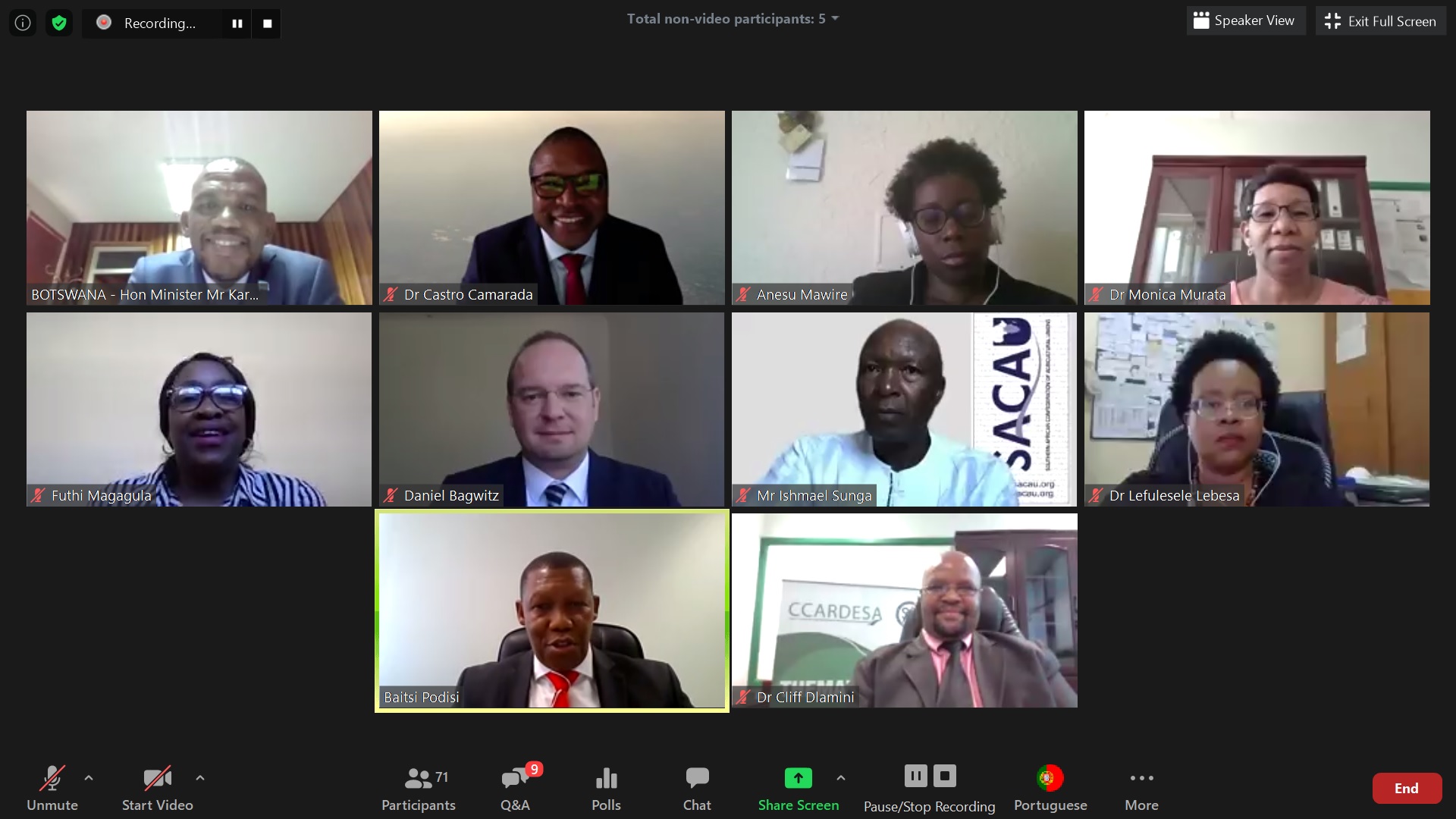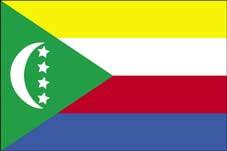CCARDESA Commemorates its 10th Anniversary

The Centre for Coordination of Agricultural Research and Development for Southern Africa (CCARDESA commemorated its 10th anniversary on 29th October 2020 through a webinar under the theme “Strengthening Agricultural Research and Development for Sustainable Food and Nutritional Security in Southern Africa”. During his official welcoming remarks, Professor Castro Paulino Camarada, the CCARDESA Board Chairperson provided the background information on CCARDESA. He indicated that SADC Member States established CCARDESA to coordinate cooperation in agricultural research and development in the region. This was done to promote technology generation, dissemination and adoption and contribute towards improved food security and livelihoods in the region. Prof. Camarada also indicated that the SADC Council of Ministers approved the establishment of CCARDESA on 26th February 2010 and the Charter establishing CCARDESA entered into force on 5th April 2011. The first Board of Directors for CCARDESA was appointed by the SADC Ministers responsible for Agriculture and Food Security in July 2011. The technical work of CCARDESA started in earnest in 2013 after the recruitment of the core staff for the Secretariat to run with the implementation of the mandate of the organization.
The webinar was graced by Hon Karabo Gare the Minister of agriculture in Botswana who said that as hosts of the CCARDESA Secretariat, Botswana was very excited to celebrate this significant milestone of seeing CCARDESA turn 10 years from the time when the idea of setting it up was approved by Ministers Responsible for Agriculture and Food Security in 2010. He mentioned that Botswana’s resolve to host and support CCARDESA demonstrates the country’s firm belief that regional cooperation in agricultural research and innovation is essential for the development of agriculture and the attainment of food and nutritional security in the country and the SADC region.
Hon Karabo further cited the SADC 2020 Synthesis Report on the State of Food and Nutrition Security and Vulnerability in Southern Africa which indicated that close to 44.8 million people in both urban and rural areas of Southern Africa would be food insecure this year. This reflected an increase in food insecurity by almost 10% in 2020 compared to 2019. Hon Karabo said these challenges are the more reason why organizations like CCARDESA should be supported because they seek to improve the food security of the SADC region.
Hon Karabo also shared how agriculture plays an important part in Botswana’s economy, especially as a form of employment and sustenance for the rural communities. Furthermore, the agricultural sector has been identified as a possible vehicle for revitalising the Botswana economy because this sector holds keys to addressing unemployment, food security and wealth creation for the people. He encouraged CCARDESA to continue promoting agricultural research and development because they are the bedrock of the region’s food security.
The Executive Director of CCARDESA, Dr Cliff Sibusiso Dlamini, thanked all the partners and stakeholders for participating in the webinar. He then shared a summary of the CCARDESA long-term Strategic Plan of CCARDESA and how the Medium-Term Operation Plan is a tool that will be used to operationalize the long-term strategy. He further mentioned that CCARDESA is finalising a Resource Mobilisation Strategy and Action Plan, which will be shared with partners to mobilise resources for the implementation of the MTOP. He went on to say that resource mobilisation goes beyond finances but include human resources, infrastructure, equipment, and mentorship. Responding to a question on how CCARDESA has survived for the past 10 years. Dr Dlamini said that CCARDESA has survived because of the support from all spheres including from governments in SADC member states, partners, and all stakeholders. Without the partnership, CCARDESA cannot fulfil its mandate, said Dr Dlamini. He extended hands of collaboration by indicating that CCARDESA was available cooperation immediately and in the future.
At the same function, Dr Monica Murata from CCARDESA highlighted the CCARDESA achievements since 2010. It was amazing to note the huge contributions that CCARDESA had made through its World Bank-funded Agricultural Productivity Programme for Southern Africa(APPSA), The German-funded project on “Adaptation to climate change in Rural Areas in Southern Africa(ACCRA)” and the EU-funded Comprehensive Africa Agriculture Development Programme ex-Pillar 4 (CAADP-XP4) programme among other projects. It became clear that CCARDESA is living its mandate and remains relevant to the needs of the SADC region.
The SADC FANR Director Mr Domingos Gove indicated that CCARDESA was not only carrying out its mandate, but it was working towards meeting the SADC objectives of attaining the Malabo declaration through supporting its member states.
During the webinar, there was a panel discussion of International Cooperating Partners who discussed the resourcing of agricultural research and development for food and nutritional security in Southern Africa. They also covered the urgent priority areas they are working on and those that CCARDESA could consider going forward. Ms Anesu Mawire from USAID shared the work that USAID is doing in the SADC region such as projects to boost seed harmonization and to support domestication of seed protocols. She cited youth inclusion as a key priority area that CCARDESA should continue working on moving forward. Mr Daniel Bagwitz the Country Director of SADC/GIZ also shared the work that they have done in the region including its support to CCARDESA’s Information, Communication and Knowledge Management system, tackling the impact of climate change through risk and vulnerability assessments, among others. He mentioned digitalization as one of the priority areas that CCARDESA should embark on vigorously. Mr Guido Rurangwa, the Resident Representative for World Bank Botswana Country Office and the Special Envoy to SADC also shared the programmes that they are implementing including the APPSA programme whose objective is to increase the availability of improved agricultural technologies in participating countries in the SADC region. He cited private sector engagement as a priority area that CCARDESA should consider because it can yield more results in strengthening food security in the region. Lastly, Dr Nalishebo Meebelo from the Regional Network of Agricultural Policy Research Institutes (ReNAPRI) shared the network’s programmes around the region and how they are impacting communities. She indicated policy influence as one priority area that CCARDESA should embrace to ensure its ultimate success in bringing about change in the agricultural sector in the region.
In his vote of thanks, the CEO for the Southern Africa Confederation of Agricultural Unions (SACAU), Mr Ishmael Sunga extended a hand of solidarity to CCARDESA and committed to strengthening the existing partnership between the two organizations.
The webinar was attended by over 70 participants from across the SADC region. This was the 1st of the two planned commemorative webinars. The second one is to be held early next year.

























































